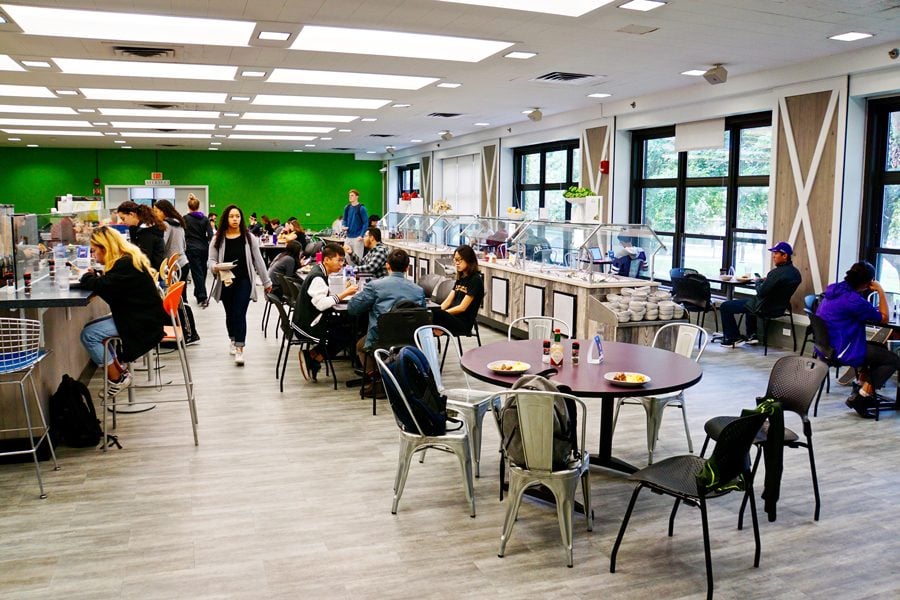Students with food allergies see room for improvement in dining hall accommodations
Evan Robinson-Johnson/Daily Senior Staffer
Compass Group opened Pure Eats stations across campus to serve food without the top nine allergens.
October 3, 2019
Isabelle Matthies was spreading seed butter on her gluten-free toast last year when she noticed an unexpected seasoning: mold. Gluten-free bread spoils after sitting out for a couple of days, so someone wasn’t paying attention. The SESP junior said despite dining provider Compass Group’s efforts, mistakes still slip under the radar.
Like last Saturday, Matthies was eating in Foster-Walker East — a Pure Eats dining hall free of the top nine allergens — when she saw a smoothie that looked out of place.
“In the ingredients were greek yogurt and fat-free milk. And that’s not dairy-free,” Matthies said. “I was very upset.”
Compass Group said in an email that the smoothie was removed from the dining hall within 10 minutes.
“To ensure the safety of our diners in the future, manager and associate training is being conducted and reinforced for all Pure Eats stations and overall allergen awareness,” the email wrote.
Over the past year, three dining halls on campus have opened Pure Eats stations, which do not serve shellfish, fish, peanuts, tree nuts, dairy, soy, wheat, eggs and sesame, Compass Group wrote in an email to The Daily. A fourth dining hall, Foster-Walker East is the only that offers exclusively Pure Eats options.
However, Foster-Walker East is open in two shifts, between 11 a.m. and 1:30 a.m. and 5 p.m. to 8 p.m., which can cause problems.
“If you have classes, you’re screwed,” SESP junior Isabelle Matthies said. “The hours are entirely unpredictable at other stations.”
A list of ingredients always accompanies food served in the dining halls, but Weinberg freshman Ire Arogundade said they have their limitations.
“Sometimes the lists will just say ‘brownie mix and water,’ and then you can’t tell if the brownie mix has eggs,” Arogundade said, “so you just can’t eat it.”
Communications sophomore Harry Echtman said the Pure Eats menus lack variety, notably missing plant-based protein sources for vegetarian students and gluten-free desserts.
Some students have learned to navigate the limitations of Pure Eats stations. Medill freshman Vaibhavi Hemasundar said she opts for Allison’s grilled chicken, vegetables or salad bar.
“I’m actually healthier here than I am back home,” Hemasundar said. “I don’t feel nervous about going to the dining hall. There are some days where there are no entrees that I can have and I’ll just get a salad, but most of the time I’m good.”
In preparing to leave for college, Hemasundar said she was most worried about having an allergic reaction in front of her friends.
Dr. Ruchi Gupta, a food allergy researcher affiliated with the Feinberg School of Medicine, said Northwestern has a good system in place, with leaders who care deeply about food allergies. But in a setting with so much food served day after day, attention to detail is crucial in preventing potentially life-threatening allergic reactions.
Gupta partnered with the Segal Design Institute to develop plans and policies for college students with allergies. According to her study, Northwestern primarily needs orientation education to inform students on what an allergic reaction looks like and how to help.
“Educate your new friends,” Gupta said. “Make sure people know what to look out for with an allergic reaction. Be proactive. Advocate for yourself.”
Email: maiaspoto2023@u.northwestern.edu
A previous version of this article misnamed the spread that SESP junior Isabelle Matthies used on her toast. She used seed butter. The Daily regrets the error.



